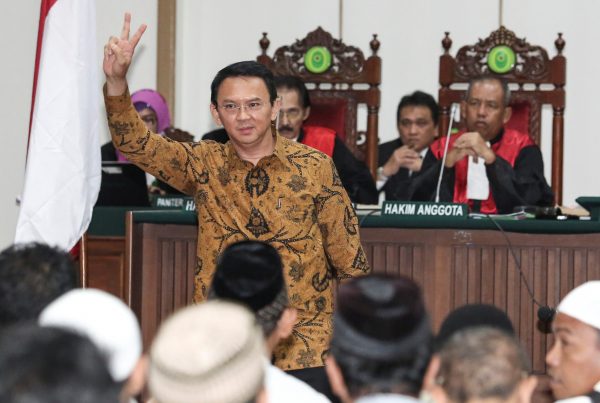Since video footage of Ahok supposedly insulting Islam went viral on social media there has been a groundswell of anti-Ahok hate speech. This has been further inflamed by his ‘double minority’ status due to his Chinese ethnicity and Christian faith.
On 11 October the Indonesian Ulema Council (MUI) formally issued a fatwa demanding that the authorities charge and prosecute Ahok for insulting the Quran. The fatwa also urged for calm during the judicial process but this request has largely fallen on deaf ears, particularly among small hard-line Islamist groups such as the Islamic Defenders Front and Hizbut Tahrir Indonesia. These two groups formed an Islamist coalition called the National Movement to Guard the MUI Fatwa (GNPF-MUI) and went on an aggressive anti-Ahok media campaign.
On 4 November about 150,000 Muslims protested in the streets of Jakarta, pressing for Ahok to step down and be charged under blasphemy laws. The protest, organised by GNPF-MUI, turned violent after President Joko Widodo (Jokowi) refused to personally meet the protesters. The scale of this demonstration made it clear that Jokowi could no longer dismiss the gravity of the issue and the changing political climate it presages.
Jokowi then met with influential Muslim leaders and politicians and openly accused ‘political actors’ of masterminding the public unrest. But even Ahok ally Jokowi could no longer afford to be on Ahok’s side, even if he personally believes that Ahok is innocent.
The government quickly asked for the investigation to be expedited to prevent further unrest. Police officially charged Ahok for blasphemy on 17 November and completed the investigation within a week. The prosecution team took only three days to declare the case ready for trial, and announced on 1 December that the trial was to be fast-tracked for later in the month.
Even with the unusual and worrying haste in which the case has been processed, Islamist groups continued with their anti-Ahok narrative as a rallying point for even bigger protests. On 2 December another anti-blasphemy demonstration took place in central Jakarta. It attracted at least twice the size of the 4 November demonstration, with estimates ranging from 500,000 to 750,000, making it possibly the largest single religious gathering in Indonesian history. Large numbers came from outside Jakarta, including many from outside Java.
The 2 December protest was peaceful in that, unlike the previous one, the event concluded calmly in the early afternoon after mass Friday prayers. But some of the speeches given by the leaders of the protest such as the Islamic Defenders Front head Habib Rizieq Shihab were filled with messages of hate, intolerance (including calling Ahok a ‘kafir’ or ‘infidel’) and defiance of due judicial processes.
Jokowi’s brief appearance on the main protest stage to pledge a fair trial and appease the mob only added legitimacy to the Islamist groups’ agenda. Jokowi’s reaction revealed just how dangerous this issue has become, and how successful hard-line Islamist groups and political opponents have been in utilising Ahok’s case to rile up angry mobs and increase their sphere of political influence.
Now what will undoubtedly be a controversial and closely-watched trial has begun. Ahok’s defence team has already pointed out procedural errors in the investigation, including that the Letter of Order for Investigation required prior to the naming of a criminal suspect was never issued.
But the court denied the defence’s motion to dismiss, even with evidence of procedural errors. Considering the enormous public and political pressure it is also unlikely that Ahok will be found not guilty, regardless of the evidence.
The most likely scenario is that Ahok will eventually be found guilty and go to jail for a shorter amount of time than the maximum sentence for blasphemy of five years. Ahok would become a political martyr to his supporters as well as to Indonesia’s minorities and progressives. Ahok could then stage a political comeback on this platform in the future.
But this blasphemy case has in many ways become far greater than Ahok. The complex saga has revealed the true depth of rifts that exist in Indonesian society between religions, classes, and those on opposite ends of the ideological spectrum — specifically among progressive and conservative Muslims.
Whether or not Ahok is found guilty, this case has set a dangerous precedent that the blasphemy law could be used to bring down non-Muslim politicians or public figures. It is also a huge blow for pluralism, civil society and human rights in Indonesia. For a country that has claimed to be a tolerant and moderate Muslim-majority democracy, the Ahok blasphemy allegation signals a regression in religious freedom and the rights of minorities.
Charlotte Setijadi is a Visiting Fellow in the Indonesia Studies Program, ISEAS-Yusof Ishak Institute, Singapore.

